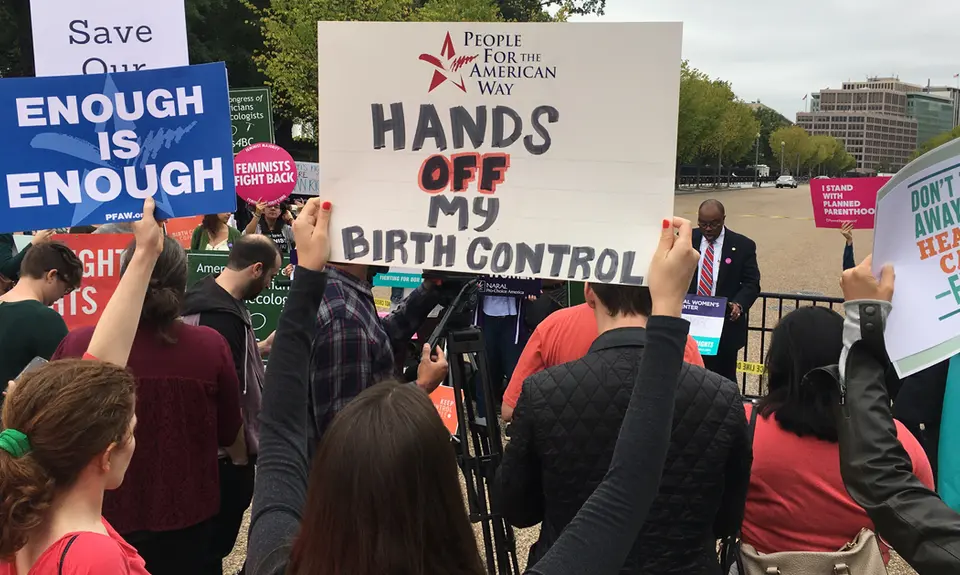In 2018, People For the American Way Foundation joined organizational allies to challenge the first draft of President Trump's discriminatory birth control rollback, which carves out sweeping religious and moral exemptions that allow employers and universities to withhold comprehensive reproductive health care coverage. We are now challenging the final rules set to go into effect on January 14. As filed in California v. Azar:
INTEREST AND IDENTITY OF AMICI CURIAE
Amici the National Women’s Law Center, the National Latina Institute for Reproductive Health, SisterLove, Inc., the National Asian Pacific American Women’s Forum, and the 40 additional organizations listed in the Appendix, are national and regional organizations committed to obtaining racial justice, economic security, gender equity, civil rights, and reproductive justice for all, which includes ensuring that individuals who may become pregnant have access to full and equal health coverage, including contraceptive coverage without cost-sharing, as guaranteed by the Affordable Care Act (“ACA”). We submit this brief to demonstrate the irreparable harm that will result, particularly to those who face multiple and intersecting forms of discrimination, if the administration’s final rules regarding the ACA’s contraceptive coverage requirement are permitted to go into effect as scheduled on January 14, 2019.1
INTRODUCTION AND SUMMARY OF ARGUMENT
At stake in this litigation are the health and livelihoods of people in the Plaintiff States and across the United States who will suffer irreparable harm under the administration’s two final rules regarding the ACA’s contraceptive coverage requirement2—particularly Black, Latinx,3 Asian American and Pacific Islander (“AAPI”) women and other people of color, young people, people with limited resources, transgender men and gender non-conforming people, immigrants, people with limited English proficiency, survivors of sexual and interpersonal violence, and others who face multiple and intersecting forms of discrimination.
The ACA’s contraceptive coverage requirement requires employers to provide insurance coverage without cost-sharing for all FDA-approved methods of contraception for women, and related education, counseling, and services.4,5 Congress intended the Women’s Health Amendment of the ACA to reduce gender discrimination in health insurance by ensuring that it covers women’s major health needs and that women no longer pay more for health care than men, including by decreasing the cost of contraception.6 The Departments of Health and Human Services, Treasury, and Labor (the “Departments”) previously acknowledged this intent, explaining that Congress added the ACA Women’s Health Amendment because “women have unique health care needs and burdens . . . includ[ing] contraceptive services,” and that the “Departments aim to reduce these disparities by providing women broad access to preventive services, including contraceptive services.”7
The ACA contraceptive coverage requirement has furthered these aims by eliminating the out-of-pocket costs of contraception and ensuring coverage of the full range of FDA-approved contraceptives and related services for women. Today, an estimated 62.8 million women are eligible for coverage of the contraceptive method that works best for them, irrespective of cost.8 As a result, use of contraception—especially highly-effective long-acting reversible contraceptives (“LARCs”) such as intrauterine devices (“IUDs”) and contraceptive implants—has increased.9
The final rules would reverse these gains by establishing a sweeping exemption permitted by neither the text nor the legislative history of the ACA, allowing virtually any employer or university to deny insurance coverage for contraception and related services to employees, students, and their dependents. These expansive exemptions would undermine gender equality by reintroducing the very inequities that Congress meant to remedy.
This brief first establishes that the Departments dramatically understate the harm the final rules will cause if allowed to take effect, both in terms of impact on people with limited means and the sheer number of people affected. Second, the brief provides data showing that the rules will make contraception cost-prohibitive and will create other non-financial barriers to contraception for many who lose coverage. Third, the brief discusses the multiple ways the rules will irreparably harm those who lose contraceptive coverage. The rules will: (1) jeopardize health by increasing unintended pregnancies and aggravating medical conditions managed by contraception; (2) undermine individuals’ autonomy and control over their lives; and (3) threaten individuals’ economic security. As highlighted throughout this brief, the rules will particularly harm people of color and others who already face systemic discrimination in the Plaintiff States and nationwide.
Because the final rules, if implemented, would result in nationwide, irreparable harm absent preliminary relief, Amici urge the Court to grant Plaintiffs’ requested injunctive relief.
We plan to reissue this brief as developments warrant:
- 1/7/19: Brief filed in Pennsylvania v. Trump
